- Home
- Steven Becker
Wood's Revenge Page 9
Wood's Revenge Read online
Page 9
“Where are we going, Mac Travis?” she asked, snapping out of her trance.
“Back to Mel. She’s at the Anchor. We’ll figure out what to do about Tru when we get there.” Mac pushed down the throttle to preempt any further conversation. They pulled into the canal several minutes later and docked in the vacant spot they had left. “Maybe you should wait here. See if you can channel him again, or whatever it is you got going,” Mac said.
“True that, Mac Travis. You go your way and I’ll go mine.”
Mac hoped that would indeed be the case, but suspected she was not going anywhere. From the time he had met her, he had been suspect. The woman was an enigma: a hippy with a credit card, and that usually meant trust fund. The type of person he had no time for. He tied off the lines, adding an extra spring line astern, as Rusty had advised, and walked toward the bar.
It was busier now as the locals were getting off work. Mel sat in the corner at a table, talking to another woman whom he recognized as the marine biologist from the turtle place. As he got closer, he saw the look on Mel’s face and knew he was in trouble. Dodging the mystic on the boat and the advocate sitting in front of him, he moved to the bar.
“Looks like you could use a cold one,” Rusty said, sliding a beer down toward Mac.
“Women with a cause,” Mac lamented, taking a sip.
Jane slammed her hands on the wheel and tried the throttle one more time, even though she knew she was only digging the boat in deeper. She had no idea the water was this shallow this far out. At least around Miami, everything was properly marked. It was not her lack of knowledge that upset her, but rather that those two idiots had outwitted her twice now—in one afternoon.
She shut off the engine and called Hector, who said he would be out in twenty minutes. After yelling at him to make it ten and leave his brother behind, she sat down and planned her next move. Coming down here might have been a mistake. It was not her element, and it showed. The only way out was to erase any evidence that she had been here.
Her phone rang, bringing her back from her tantrum, and she looked at the screen. It showed Philip’s name. Taking a deep breath, she tried to collect herself and answered. He was not the kind of man you sent to voicemail.
“Yes,” she answered.
“Have you seen the news?” he asked.
“No. I’ve been a little busy putting things in order here.”
“There was a report about a dead body found floating near Marathon yesterday. All the networks are picking it up. They made an ID, and it’s the scientist,” he said calmly.
Despite his apparent demeanor, she knew he was angry. “I’ll handle it.” She looked back at Marathon, wondering where Hector was.
“Just remember we are under a deadline. The congressman will be here this weekend for the rally. Everything needs to be in order by then.”
The line went dead and she stared at the phone. This kind of conversation was typical for him, nothing to worry about on that account. But with the spectacle he was about to unleash, there was no room for error. Although business rivals, the major players in sugar allied in their fight for survival. Often one group would support Democrats and the other Republicans just to further rig the game and have everyone in their pockets. It had worked. Even public initiatives like the land buyback, where the state was empowered by the voters to purchase agricultural lands, allowing them to become overgrown, mosquito-infested swamps again, were squashed by the political clout of the alliance.
The environmental groups wanted the natural water flow restored, and he would be happy to accommodate them. They didn’t like the way Alligator Alley and Highway 41 cut across the state blocking the historical flow. Well, he could fix that too, but not in the multiyear, billion-dollar plans they had that would take away his land and penalize him financially. He was going to do it the easy way.
It was a win-win. Give the activists what they wanted and claim more land for sugar.
The sound of an outboard distracted her from her thoughts and she looked toward the bridge. A jet ski was heading in her direction, and she thought about picking the gnat off the water with one of the few remaining bullets she had left when she saw it was Hector. A minute later, he pulled next to the grounded boat.
“Give you a hand?” he asked.
“You can cut that smug bullshit right now,” she said, thankful that he had left his obnoxious brother back at the bait house. “Couldn’t you find anything bigger?”
“Manuel is in a rage. If it weren’t for claiming your car as collateral, he’d be out here himself. As it is, I had to run across the street and rent this.”
At least he had a little ingenuity. “Well, what now?”
“It’s no big deal. The tide is coming up. I’ll pull you off.” He slid the jet ski onto the sandbar and lifted the seat. Removing a tow rope used to pull water skiers, he hooked one end on the bow cleat of the hot rod and the other end to the jet ski. “Which end do you want?”
The jet ski scared her. Preferring the power and comfort of bigger, more luxurious vessels, she had never been on one; her only experience with the craft was their obnoxious sound ruining the solitude of her retreats. She climbed over the low gunwale of the hot rod and went to the helm.
Hector came behind the boat and pushed against the transom—the boat didn’t budge.
She would have shot him then if she didn’t need him, but she needed to get the two fishermen. They were going to pay for this. Her attention turned back to the jet ski. Hector started the engine and moved forward, slowly taking the slack out of the line. As it tightened he increased speed and, with a snap, the rope was taut. He gunned the engine, sending a plume of water back.
“Goddamn bastard,” she yelled over the roar of the jet ski’s engine straining against the larger craft. “You and all those other sorry fuckers will pay for this.” Water continued to rain down on her as Hector continued to try and pull the boat off.
She was about to throttle him but stopped herself and breathed deeply—in for four counts, hold for two, out for four, and another hold. Box breathing, one of her gurus had told her. It worked, and she felt her blood pressure drop below the red line. Whatever it took, she needed him to navigate these waters and find the fishermen. A flash from the windshield of a passing boat caught her eye. It was too far away to see much detail, but she could clearly see the smile of the driver.
Soaking wet, she climbed out of the grounded hot rod and motioned for Hector. He circled back, a wary look in his eyes, which she disarmed with a fake smile. “Can that thing take both of us?”
Without waiting for an answer, she climbed on the back. Pulling the gun from her designer bag, she shoved it in the front of her shorts, gunslinger style, and pushed the bag over her shoulder. Fortunately, she had dressed for the Keys and not South Beach.
13
Trufante struggled with the starboard engine while the boat plowed through the water. Rigged for twin engines, it was not designed to run on one, making it impossible to get up on plane.
“Why we goin’ this way? Back way’s faster,” Jeff said. “We gotta pass right by her again to get under the bridge.”
“Got no electronics. You want to find that backdoor passage without eyes?” Trufante went back to work. It was indescribably harder to work on a boat while underway, and the engine was giving him trouble.
“Right. See your point there.”
Trufante turned his attention back to the engine, wishing he had a beer to remove the taste of fuel in his mouth from clearing the line.
“Try her now,” he yelled.
The flywheel spun, but the motor would not catch.
“Hey. Some fool with a jet ski is trying to pull your ladyfriend off the sandbar.”
Trufante lifted his head up just in time to see the plume of water drench the woman at the wheel of the speedboat. He stopped for a minute and went to the helm. Both men watched the show as the jet ski tried to pull the other boat off the sandbar. “She’s gonna be
pissed now,” Trufante said, exposing his big grin.
He went back to the engine. Disconnecting the fuel line, he put his index finger over the opening to stop the flow. Instead of feeling gas pushing through the line he felt a suction. The other engine had created a vacuum. They would have to stop to start both engines. After replacing the line and cowling, he returned to the helm.
“We’re gonna have to stop,” he said, looking back at the action on the flats. The speedboat was still there with a jet ski alongside it, and he could see the woman yelling at a man that looked like Hector. She climbed on behind him. The jet ski took off toward Marathon, made a tight turn and then headed directly for them. The gap was closing quickly.
“Holy crap. They’re coming after us,” Jeff said, ducking as a bullet grazed the fiberglass ceiling above him.
Trufante had to act fast. There was no way they could stop and prime the fuel line to get the other engine running. Without it, the jet ski would easily overtake them. Another bullet flew past, but he ignored it, trying to figure a way out. Jeff was heading for the bridge and he looked back. They would be on them in minutes.
“We can ditch them round the back of Molasses Key,” Jeff said.
Trufante shook his head, looking back at the jet ski approaching them. It was skipping off the waves, fishtailing when it lost control. He had some experience with the craft from a gig he had taken at a tourist rental in Key West during a slow fishing season. Working as a helper on a parasail boat hadn’t been his thing, but he had been around jet skis and tried to remember their quirks.
Brake and steer, he remembered the two things the personal watercraft couldn’t do. There was no reverse, no rudder or propeller in the water to slow the forward progress; they stopped when they ran out of inertia. And without power there was no way to steer.
“We’ve got to let them catch up,” Trufante said, trying to visualize his idea. “Let ’em come alongside.”
“And what about the gun?” Jeff asked.
“She’s gonna shoot at our sorry asses one way or another. I’m hoping if we look like we’re giving up—” Another round of gunfire slammed into the boat, sending both men to the deck.
“She stopped shooting,” Trufante said, rising above the gunwale and looking back at the jet ski.
“But we’re hit,” Jeff said, pointing back to the fuel line spurting gas onto the deck. “We gotta get back.”
The engine was starting to miss now, probably from air entering the fuel line. “Can you make Pigeon Key?”
Jeff turned the wheel and headed toward the small island at the end of the old span of the bridge. The boat sputtered again and Trufante looked back at the jet ski. They had turned to follow. The island was getting closer. The small key, situated two miles from Marathon and still connected by a section of the old Seven Mile Bridge, was still inhabited. He’d met a few of the college-age students in a bar talking about some kind of research they were doing there.
“See the dock?” he yelled at Jeff, pointing to the small pier sticking out into the Gulf side.
“What about her?” he asked, looking back at the jet ski.
“We’ll just have to take out chances.”
The engine sputtered again. It was getting worse and sounded like it was about to stall. Trufante ran back to the transom and pumped the primer ball. Gas squirted over the deck from a nick in the line. One of the bullets must have grazed it. Placing his free hand over the gash, he squeezed the ball and felt the rpms rise. The jet ski was still following, but cautiously. Something had spooked the woman, or she was out of ammunition.
Jane yelled over the whine of the jet ski, “Can you keep this thing straight?” She hit the release and the empty magazine dropped. He hit another wave and she dropped it into the water. With one arm still tight around Hector, she slung her purse in front of her, fished out another magazine, and tried to slam it into the receiver. The jet ski bounced again, spinning to the side when it lost contact with the water and she almost lost her grip on the gun. “I have to reload. Can you help me out here?” she screamed.
She felt him ease off the throttle slightly, and, instead of careening off the tops of the waves, the reduced speed allowed them to ride them. She saw the island ahead. “Run them into it,” she said, pointing over Hector’s shoulder. She took a deep breath, willed the magazine into the gun, and when it clicked into place, pulled back the slide to chamber a round.
Hector started to make his move to the outside. She took aim and fired twice. Both shots struck the boat, and she saw the driver and the tall Cajun duck. But they held their course. “Get closer,” she yelled to Hector, firing again. She was being conservative with her shots, not wanting to have to reload on the water again. Looking around, she saw another problem and slid the gun back into her shorts. The bridge traffic had come to a crawl, and she could see the passengers watching them. Now she had to worry about eyewitnesses calling the police.
“What should I do?” Hector called back to her.
She was getting angrier by the second. Losing to two rednecks was not in her DNA. “You know where those two live?” she asked. Putting her ego away was hard, but she needed to get a handle on the big picture. Going to jail for shooting two rednecks would ruin Dusharde’s plan. There were other ways of handling this. She would just have to forsake the gratification of doing it herself.
“Yeah.”
She was about to order Hector back to land when she saw the boat turn toward them.
Mac resigned himself to deal with the three women. Fortunately, Pamela was still in a trance. He looked over at her body jerking every few seconds, like someone was shooting at her. Mel and Jen boarded the boat and he released the lines. The trawler moved slowly out of the canal and he turned left toward Vaca Cut, the closer pass to the Gulf side, hoping to reach the site before it got dark.
“What’s with her?” Mel asked.
“Been hanging out with Cheqea. Tru told me she was all into that Indian mystic crap.”
Mel looked at her and shook her head. “How are you going to find the spot?”
“Do you still have the SD card from the wreck’s GPS?” Mac asked.
She dug around in her bag and handed it to him. Key Colony Beach was just ahead now, and he turned into the channel. The pass was narrow but well marked. They skirted the charter dock on their port side, went under a small bridge and were looking at the open water of the Gulf. Mac pushed the throttles down and fumbled with the memory card, finally getting it in the slot of his GPS.
Navigating from screen to screen, he loaded the data from the card onto the unit and watched as it plotted the waypoints on the chart. In addition to the points, he clicked the button marked Tracks and dotted lines appeared, showing the path the boat had followed.
“That looks like the area,” Mac said, pointing to a waypoint.
“It’s the furthest west. Maybe that means something,” Mel said.
Jen leaned in and looked at the screen. “It means the contaminated area is getting closer. I bet if we go into the log and compare the waypoints with the dates they were entered there will be a pattern.”
Mac hit GoTo and adjusted his course to the bearing from the GPS. Once the boat settled onto the new heading, he studied the tracks. Most were in-and-out shots from the same point in Islamorada. “That’s a long way for from here.”
“It’s clearly moving fast toward Marathon. I need to get water samples and then somewhere to run the data on the waypoints and see if we can figure out how much time we have. The filters at the hospital can’t deal with this kind of algae bloom. There are twenty turtles in our tanks now. They could all die.”
She was working herself into a panic. “Calm down. We’ll get the samples and get the data run. This was brought down by the king tide and storm. The ocean has its own magic and usually heals itself,” Mac said.
“But. The turtles . . .”
“Mac, she might be right,” Mel said, coming out of the cabin. She had her laptop under
her arm and a chart in her hand. “I pulled the dates and waypoints from the data and plotted them on the chart.” She spread the chart out on the seat. “It’s moving by itself. The tide might have pushed it faster, but it was moving at about three miles a day on its own.”
Mac did the math in his head, realizing that if she was right it would only be three days before it reached Wood’s Island and one more for the Turtle Hospital. “I wonder why there haven’t been any reports?”
Mel knew firsthand how tight-lipped the locals could be. “You know the guys that fish this far out on the back side. They’re not going to do anything to bring in the authorities.”
He knew the feeling the residents had about the myriad of agencies that had flooded the area, all trying to protect it. What they did was cost jobs and step on each other’s feet. It took a lifetime of experience—not a classroom—to even begin to understand the ecosystem here. There were too many variables controlling the unique ecosystem where the Atlantic and Gulf of Mexico were separated by the thin strip of coral atolls. The massive Gulf Stream current, running just offshore, only added to the complexity.
“If it’s moving by itself, it has to be coming from somewhere. If we can find the source, we can fix it.”
“If it were only that simple. She’s right, though. This should be modeled. We need to add in the major and minor currents as well as the tides and weather for the days between the waypoints.”
“Alicia,” they both said at the same time.
“I like her,” Pamela said, coming back to life.
“Who?” Jen asked, ignoring the outburst.
“Alicia Phon, she’s so fine. She’s so fine she blow my mind.” Pamela started humming again.
“She’s an ex-CIA analyst. Lives with a friend of Tru’s in Key Largo named TJ,” Mel started.
“Woman’s a computer genius,” Mac said and accelerated.
14
Trufante looked around for a way out. Gas poured through his fingers still gripping the shredded line, but it was a no-win situation. When Jeff accelerated, the suction created by the fuel injectors pulled air into the line, causing the engine to sputter. If he released pressure, Trufante could control the flow, but the jet ski would easily catch them. The end result was the boat acted like it was out of gas, surging, then slowing to almost a stall. A wave caught Trufante, throwing him off balance. Gas spurted from the line and he looked down at his two hands, each holding a piece of the line.

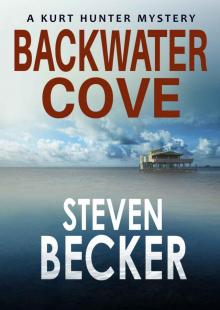 Backwater Cove
Backwater Cove Storm Surge: A Fast Paced International Adventure Thriller (Storm Thriller Series Book 3)
Storm Surge: A Fast Paced International Adventure Thriller (Storm Thriller Series Book 3)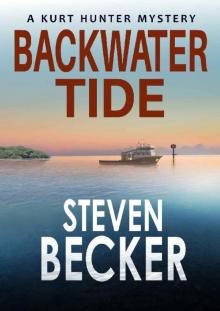 Backwater Tide
Backwater Tide Backwater Pass
Backwater Pass Backwater Flats
Backwater Flats Wood's Revenge
Wood's Revenge Haitian Gold
Haitian Gold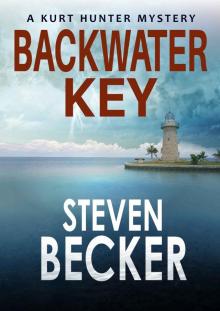 Backwater Key
Backwater Key Wood's Tempest
Wood's Tempest Uncharted Waters
Uncharted Waters Tuna Tango
Tuna Tango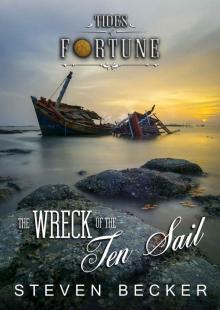 The Wreck of the Ten Sail
The Wreck of the Ten Sail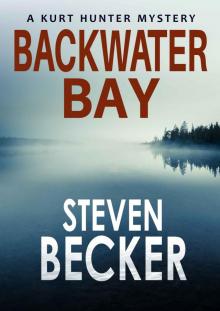 Backwater Bay (Kurt Hunter Mysteries Book 1)
Backwater Bay (Kurt Hunter Mysteries Book 1) Storm Clouds
Storm Clouds Wood's Wall
Wood's Wall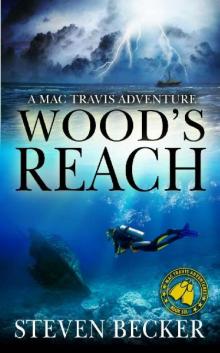 Wood's Reach
Wood's Reach Wood's Fury
Wood's Fury Storm Rising
Storm Rising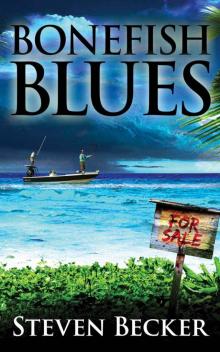 Bonefish Blues
Bonefish Blues Wood's Harbor: Action & Sea Adventure in the Florida Keys (Mac Travis Adventures Book 5)
Wood's Harbor: Action & Sea Adventure in the Florida Keys (Mac Travis Adventures Book 5)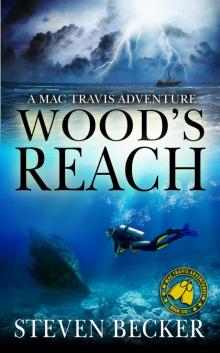 Wood's Reach: Action & Sea Adventure in the Florida Keys (Mac Travis Adventures Book 6)
Wood's Reach: Action & Sea Adventure in the Florida Keys (Mac Travis Adventures Book 6) Wood's Wreck
Wood's Wreck Wood's Harbor
Wood's Harbor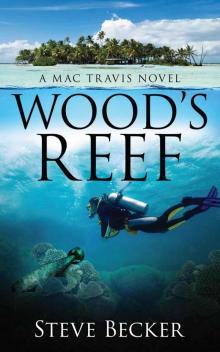 Wood's Reef
Wood's Reef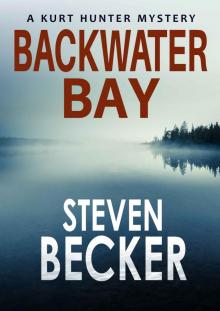 Backwater Bay
Backwater Bay